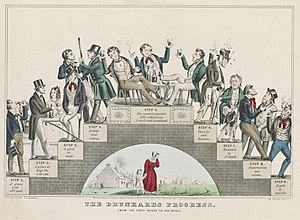Alcohol abuse
| Alcohol abuse | |
|---|---|
 |
|
| "The Drunkard’s Progress", 1846 | |
| Classification and external resources | |
| Specialty | psychiatry |
| ICD-10 | F10.1 |
| ICD-9-CM | 305.0 |
| MeSH | D000437 |
Alcohol abuse is a previous psychiatric diagnosis in which there is recurring harmful use of ethanol despite its negative consequences. In 2013 it was reclassified as alcohol use disorder (alcoholism) along with alcohol dependence. There are two types of alcohol abuse, those who have anti-social and pleasure-seeking tendencies, and those who are anxiety-ridden people who are able to go without drinking for long periods of time but are unable to control themselves once they start.Binge drinking is another form of alcohol abuse. According to surveys, the heaviest drinkers are the United Kingdom's adolescents. In 2013, 139,000 deaths globally were directly due to alcohol abuse and an additional 384,000 to cirrhosis from excess alcohol consumption.
Alcohol abuse is a pattern of drinking that results in harm to one’s health, interpersonal relationships, or ability to work. According to Gelder, Mayou & Geddes (2005) alcohol abuse is linked with suicide. They state the risk of suicide is high in older men who have a history of drinking, as well as those suffering from depression. Certain of alcohol abuse include failure to fulfill responsibilities at work, school, or home; drinking in dangerous situations, including the operation of a motor vehicle; legal concerns associated with alcohol use; and continued drinking despite problems that are caused or worsened by drinking. Alcohol abuse can lead to alcohol dependence. In the diagnosis manual DSM-5 alcohol abuse is combined with alcohol dependence to create one unified disorder, alcohol use disorder (AUD), that includes a graded clinical severity from moderate to severe with at least 2 criteria to make diagnoses. For adolescents, the DSM-5 proposes that diagnoses meeting 2 or 3 criteria would be similar to alcohol abuse while meeting over 4 criteria would be equivalent to alcohol dependence when compared to the DSM-IV.
Alcohol abuse has both short-term and long-term risks. If a person drives while drunk or regularly consuming binge drink (more than five standard drinks in one drinking session), they are considered to have been involved in alcohol abuse. Short-term abuses of alcohol include, but are not limited to, violence, injuries, unprotected sexual activities and, additionally, social and financial problems.
...
Wikipedia
